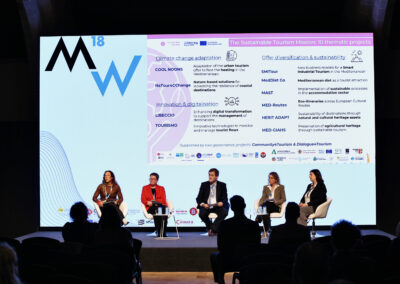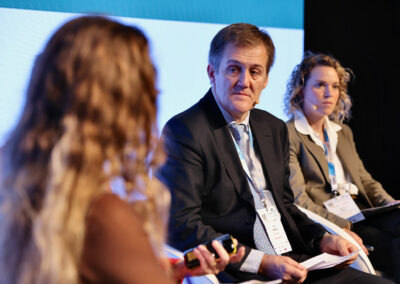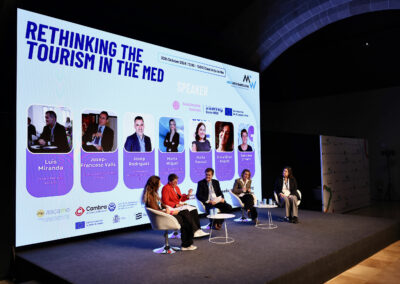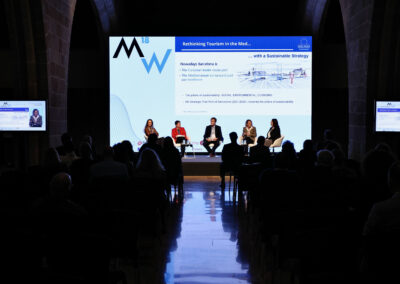
The Mediterranean Week of Economic Leaders (MedaWeek Barcelona 2024) hosted a pivotal session on sustainable tourism titled “Rethinking Tourism in the MED: Towards a New Public-Private Partnership for a Greener and More Sustainable Future”. The event was organized by ASCAME (Association of the Mediterranean Chambers of Commerce and Industry), partner of the Interreg Euro-MED project Dialogue4Tourism (D4T) last 30th October with the participation of more than 60 persons in presence and online. Among them, public institutions and private companies, transnational organisations as WestMed, Chambers of Commerce, partners of the Interreg Euro-MED Sustainable Mission, Innovative Mission and Mission for Nature, Associated Partners, Universities, Research Centers and NGOs.
The agenda included the working session on the “Sustainable Tourism Policy Labs” (STPLs) of the Dialogue4Tourism Project that was conceived as a forum, bringing the opportunity to present the main goals of the STPLs & discussing about the main challenges for enhancing institutional dialogue in the EU Mediterranean regions.
In this regard, the session started with the keynote given by Ms. Estela Delgado, ASCAME Area Manager, who announced that ASCAME will lead the initiative “Sustainable Tourism Policy Labs” aiming at encouraging an active dialogue and participation of all stakeholders and sectors involved in sustainable tourism to create collaborative solutions.
Ms. Delgado explained that the STPLs will seek to influence public policies at different levels for the adaptation of sustainable tourism embracing a fourfold approach of the Sustainable Tourism Mission of the Interreg Euro-Med Program including circularity of tourism services, environmental neutrality, sustainable ecosystem services, and preservation of cultural and natural resources.
Sharing also this vision, Ms. Georgina Calvo from Diputación of Barcelona, lead partner of the INTERREG Euro-MED Project Community4Tourism (C4T), insisted on the importance of transferring all knowledge and best practices learnt from the former INTERREG MED tourism projects during 2014-2020 to promote sustainable tourism in the Mediterranean region. Thus, she talked about the efforts deployed by the Community4Tourism Project to support this transference of knowledge and how to use EU funds to promote sustainable tourism. In addition, she pointed out that in the Sustainable Tourism Mission there are thematic projects implying investment of more than 18 million of euros.
This first part of the session was followed by the intervention of several speakers who explored the main challenges of the tourism sector enhancing the need to advance towards a new public-private partnership for a greener and more sustainable future. All the session was moderated by Mr. Luis Miranda, ASCAME Project Manager.
Starting from the main topic of local strategies for sustainable tourism and local communities, the speakers addressed different sub-topics. Thus, Ms. Genoveva Climent, Commercial and Business Development Directo of the Port of Tarragona, on behalf of the MedCruise Association and Ms. Marta Miquel, Chief Business Officer of the Escola Europea Intermodal Transport, talked about different strategies for managing the impact of cruise tourism and mass tourism in the MED coastal cities. For example, Ms. Genoveva Climent commented the importance of Governance and dialogue and the need for public- private partnerships, fostering dialogue between both sides. As best practices, she presented the cases of the city of Dubrovnik, where they are dealing the problem of mass tourism through dialogue and the case of the city of Tarragona, where they have established a public-private model of governance to avoid the impact of mass tourism in the city.
Similarly, Ms. Marta Miquel, pointed out among other issues the case of the Port of Barcelona -leader in the cruise sector- where a well-planned strategy based on sustainability has been established between public administrations and private companies with the participation of citizens. For instance, as a model of public-private collaboration she mentioned the initiative of Barcelona Activa with the cruise line Costa, which opened a customer service hub for this company in Barcelona.
Following the discussion between mass tourism and sustainability in MED touristic cities, at her turn Ms. Silvia Villaro, from the Department of Tourism of the Council of Barcelona, Barcelona Activa, presented the issue of how tourism is managed from the city’s perspective. She pointed out how the city of Barcelona has been working for a long time the balance between tourist community and local community, from the Biosphere Initiative in 2011 (based on sustainable tourism) to the Tourism Plan 2016-2020 (with sustainability as a key pillar for managing the city’s tourism activity) and the need for setting up a balance between the needs of tourists and local citizens.
Finally, the session was closed with the participation of Ms. Marta Pascual, from the Assistance Mechanism, National Hub Spain WestMed EU, who presented this relevant EU initiative for the Mediterranean and explained how they can contribute to build up a common vision about tourism in the Mediterranean region. In this respect, she talked about the different topics on sustainable tourism managed by WestMed, the existence of common points among countries and the need to exchange best practices among MED countries to be integrated in their policies.







